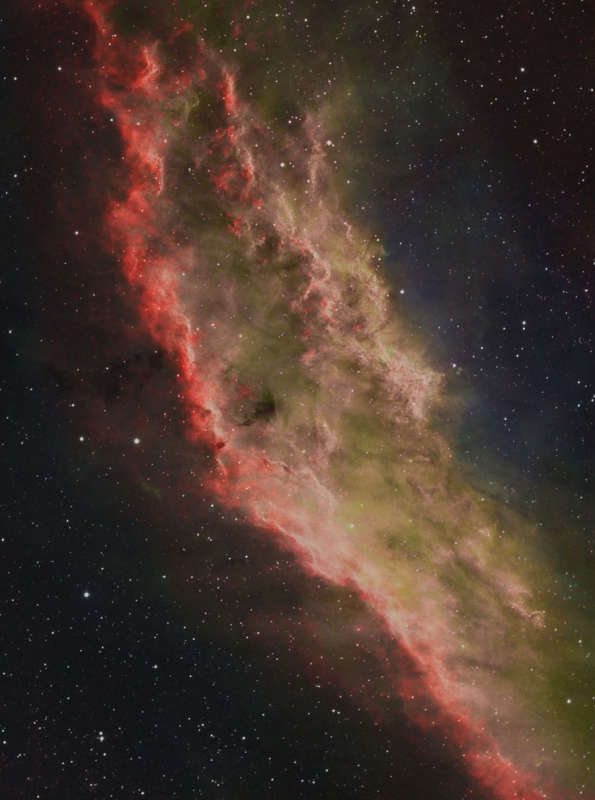Credit & Copyright: Markus Noller
(Deep Sky Images)
Explanation:
What's California doing in space?
Drifting through the Orion Arm of the spiral Milky Way Galaxy,
this
cosmic cloud
by chance echoes the outline of
California
on the west coast of the
United States.
Our own Sun also lies within the Milky Way's
Orion
Arm, only about 1,500 light-years from the
California Nebula.
Also known as NGC 1499, the classic emission nebula is around 100
light-years long.
On many images, the most prominent glow of the California Nebula is
the red light characteristic of
hydrogen
atoms recombining with long
lost electrons, stripped away (ionized)
by energetic starlight.
In the
above image, however, hydrogen is colored green, while silicon is
mapped to red and
oxygen mapped to blue.
The star most likely providing the energetic
starlight that ionizes much of the nebular gas is the bright, hot, bluish
Xi Persei,
just outside the right image edge.
A regular target for astrophotographers,
the California Nebula
can be spotted
with a wide-field telescope under a dark sky
toward the constellation of
Perseus, not
far from the
Pleiades.
1999 2000 2001 2002 2003 2004 2005 2006 2007 2008 2009 2010 2011 2012 2013 2014 2015 2016 2017 2018 2019 2020 2021 2022 2023 2024 2025 |
Yanvar' Fevral' Mart Aprel' Mai Iyun' Iyul' Avgust Sentyabr' Oktyabr' Noyabr' Dekabr' |
NASA Web Site Statements, Warnings, and Disclaimers
NASA Official: Jay Norris. Specific rights apply.
A service of: LHEA at NASA / GSFC
& Michigan Tech. U.
|
Publikacii s klyuchevymi slovami:
California Nebula - emission nebula - Deep Sky - tumannost' - emissionnaya tumannost'
Publikacii so slovami: California Nebula - emission nebula - Deep Sky - tumannost' - emissionnaya tumannost' | |
Sm. takzhe:
Vse publikacii na tu zhe temu >> | |
